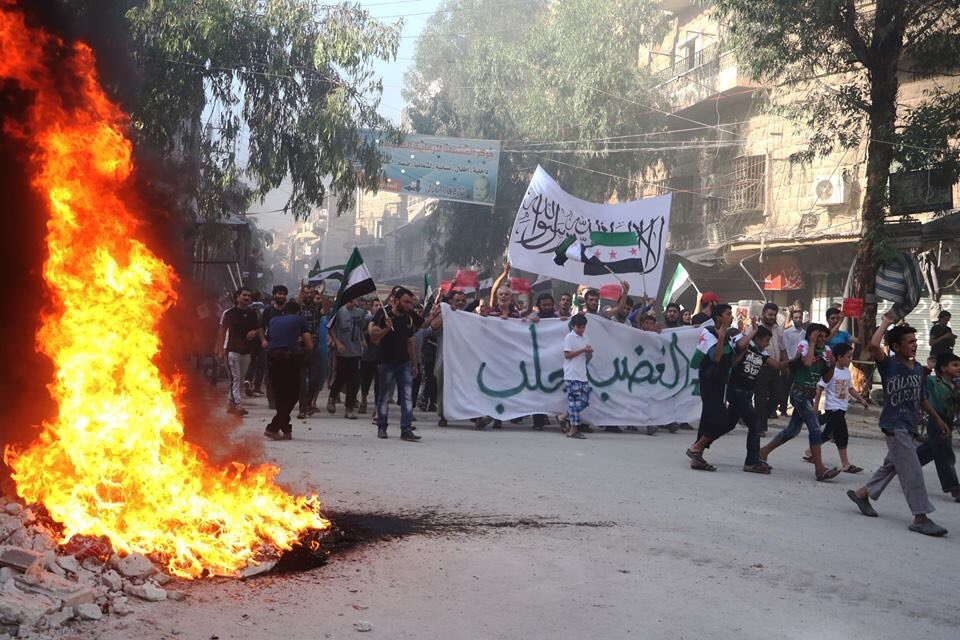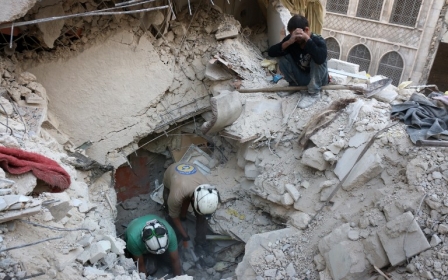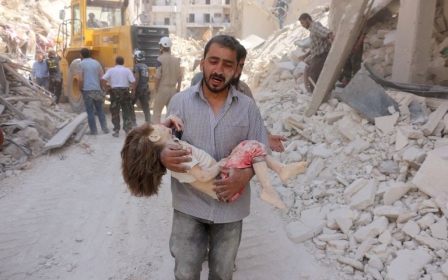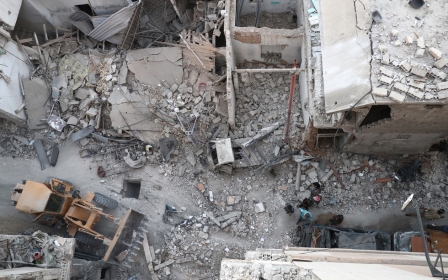Q&A: The pitfalls of a no-fly zone over Syria

Amid the images of death and destruction coming out of Syria, many around the world are asking why the West is not intervening to stop the suffering of civilians in eastern Aleppo.
From signs on protests in besieged areas of eastern Aleppo to talks between rebel groups and the international community, the proposal to implement a no-fly zone has come up time and time again.
But what exactly is a no-fly zone (NFZ)? And why was the international community quick to implement one in Libya but not in Syria?
Middle East Eye spoke to Dr Andreas Krieg from the Defence Studies department at King’s College London to get his perspective on no-fly zones, their effectiveness and the likelihood of a new intervention.
Middle East Eye: What is a no-fly zone?
Andreas Krieg: A NFZ is an area where there is no activity in the air from perpetrators accused of targeting civilians. This means having complete control of the area. Which means the ability to fly at any altitude without having any risk of being shot down from air defence systems on the ground. So if the perpetrator or regime infringes on that NFZ, you are basically allowed to shoot down that aircraft after a couple of warnings.
MEE: Would the no-fly zone need UN approval?
Krieg: Yes, but it's unlikely to happen if China and Russia continue to use their veto in the Security Council.
MEE: Has a no-fly zone ever been successful?
Krieg: No. It has never been successful. If you look at the research, an NFZ with only the air component will never be successful. It depends on what you are trying to achieve. In certain areas air power has a competitive advantage. So for example in Syria, Russian air power is the most important thing that keeps the Syrian government going. Between 2013 and 2015, before the Russians got involved, the Syrian air force was already depleted and on the defensive. Since the Russian intervention, the Syrian government has now begun to act on the offensive.
Most of the time NFZs are there to help civilians and to protect civilian lives. It is impossible to help civilians from the air alone. It’s a very important aspect of it - as was the case in Libya - that you make sure the regime or the potential perpetrator of an atrocity is prevented from using helicopters against the civilian population. An NFZ on its own is not going to make a huge difference by itself usually.
MEE: If Britain was to agree on initiating a no-fly zone, how could it pan out?
Krieg: In Syria, Britain would probably use the vehicle of the already established US-led coalition against ISIS [the Islamic State group] and expand its pre-existing setup. The British would probably fly from Turkey, Qatar or send an aircraft carrier to the Mediterranean and then enforce it from there.
When Britain considered intervening in 2013 after the chemical attack in Ghouta, the UK (government) was willing to act against Assad as a form of punishment. This scenario involved the UK using its airbases in southern Cyprus as well as aircraft carriers and Turkey. But this would really depend on how Turkey behaves in this situation. (Note: The British parliament rebelled against the government's plans, which were scrapped.)
MEE: What would British involvement contribute to a no-fly zone? What’s unique about the British RAF in comparison to every other air force in the world?
Krieg: The Cyprus base is a very important one as it is close to Syria. So the RAF could operate without relying on Turkish airbases, which gives them a competitive advantage. I would imagine that other air forces from NATO and other allies would use these bases as well. The Qataris, for example, used them in their operations in Libya.
Over the last few years, because of austerity measures and downsizing, the RAF is not in a position to do operations on its own. The RAF could not operate independently as it requires the support of other air forces. So any future intervention would be done via a coalition.
MEE: Would a no-fly zone in Syria be any different from the no-fly zone put in place over Libya?
Krieg: It would be different in that Syria has a pre-existing ground component to work with, while Libya did not. So, for example, we could use the SDF, YPG or other FSA groups that we consider moderate. But the problem is, even if NATO was to agree on a ground component, the US considers the YPG and the SDF as a surrogate on the ground, while the Turks do not.
It also really depends on who you want to use on the ground, because you don’t want to offend the Turks. In Libya, there were no boots on the ground. You cannot seize and hold territory to protect civilians purely from the air. You need boots on the ground. With Syria, you have special forces on the ground and sympathetic rebels on the ground. But we require a certain degree of coordination between these rebels, who are semi-professional at best, and some who are not professional at all. You would also need to embed air controllers on the ground, too, in order to coordinate air strikes.
The key difference between Libya and Syria is that in Syria there is a ground component in terms of ground forces ie the rebels that will complement an NFZ. So, for example, we could use the SDF, YPG or other FSA groups that we consider moderate. But obviously, it bears its own risks because these rebels might not do what you want them to do, or coordinate as effectively as you want them to. And there is an issue of Turkey not accepting some of the ground rebels. But Turkey might continue to carry out its own operations while Western forces like the French, German and other forces supported a completely different operation.
MEE: Do you think a no-fly zone could lead to a direct confrontation with Russia?
Krieg: Absolutely. There is no way that you can enforce an NFZ without infringing on the Russian air force's freedom of movement in Syria.
The air defence systems in Syria are all Russian-operated and if not, they are operated by contractors closely associated to Russia. Russia still owns much of the equipment on the ground. You would have to take out these systems because you’d need complete control of the air. If the West does this, they would definitely be attacking the Russians, unless they back down to avoid any escalation.
MEE: Do you think Russia’s faltering economy will affect any decision by Putin to escalate his intervention in Syria?
Krieg: I think Putin is operating the way he does because nobody has raised the stakes for him. At the moment the conflict is very low-risk for him. The Americans have always coordinated with the Russians, and there is no way the Russian air force will back down, since the western-backed rebels on the ground don’t have the capability to shoot down the planes. That means there is a very low operational and financial cost for them. It is also important for Russia to continue maintaining the integrity of the regime to a certain extent - but this NFZ will not be threatening the Assad regime. This NFZ is supposed to protect people in Aleppo and in the northern provinces. So I think Russia will probably come to terms with this by leaving Aleppo alone and going back to protecting core areas of the regime, which is Latakia on the northwest and the southern areas around Damascus. Escalation is not an option for Putin as he has neither the money or the capacity to do that.
MEE: Would a no-fly zone realistically protect civilians living in eastern Aleppo, especially considering that the majority of civilian deaths have been because of air strikes from the Russian and Syrian Arab army?
Krieg: It is hard to say because if there is no coordination with the ground components, how can you realistically protect civilians? But reducing bombardment from the air would definitely increase the survivability of people living in Aleppo at the moment. But it wouldn't protect them for long.
In order to do this, it would be worthwhile creating a safe haven that is different from an NFZ, as a safe haven means there are no military operations or military facilities on the ground. The Syrian regime has a history of using artillery, for example in Hama under the rule of Hafez al-Assad where it bombarded the town for weeks, killing thousands. And I’m not sure if the NFZ would have rules of engagement that would allow them to engage with these kind of ground targets. So it is very hard to make Aleppo an actual safe haven completely from the air.
MEE: So a safe haven should be instigated, rather than a no-fly zone?
Krieg: If I had all the choices in the world then that is what I would do. But I’m also being very realistic in that no one is willing to do that, because an NFZ would allow the West to say they are doing something in Syria, but at relatively low cost and without escalating the conflict further.
If you put boots on the ground in this very complex operating environment, then you are actually engaging in a proper military operation.
MEE: Could a no-fly zone lead to a further escalation of conflict in Syria?
Krieg: If we establish an NFZ it could pave the way for further escalation. If there were no results after six months, there would be the potential for policymakers and politicians to demand a further escalation. But that depends solely on what the Russians are doing, as well as on all parties involved on the ground.
Let’s not forget that the number one priority for the West is to stop ISIS expanding. The West is not a moral actor. Protecting civilians is not a priority. Nobody wants to put boots on the ground or put UK soldiers directly in harm’s way to protect Syrian civilians.
New MEE newsletter: Jerusalem Dispatch
Sign up to get the latest insights and analysis on Israel-Palestine, alongside Turkey Unpacked and other MEE newsletters
Middle East Eye delivers independent and unrivalled coverage and analysis of the Middle East, North Africa and beyond. To learn more about republishing this content and the associated fees, please fill out this form. More about MEE can be found here.




